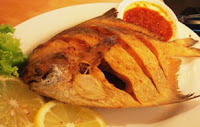Eat Healthy
Eating is one the most important events in everyone’s life. We can enjoy eating. Its part of our life. The foods we eat are the sole source of our energy and nutrition.
We are born with the desire to eat and grown up with rich traditions of eating. But we also know so little about eating - about how the foods we eat everyday affect our health. We are more confused than ever about the link between diet and health. A healthy human diet should compromise lots of vegetables and fruit, and starchy foods such as bread, cereals, and pasta (ideally whole-grain), some foods strong in protein such as meat, eggs, and pulses, and some milk and dairy foods.
Fish is a good source of protein and contains many vitamins and minerals. All are like fish very much. Aim for at least two portions a week, including at least one portion of oily fish.Oily fish is high in omega-3 fats, which may help to prevent heart disease.You can choose from fresh, frozen and canned; but remember that canned and smoked fish can be high in salt. Oily fish include salmon, mackerel, trout, herring, fresh tuna, sardines and pilchards. Non-oily fish include haddock, plaice, cod, tinned tuna, skate and hake. Anyone who regularly eats a lot of fish should try to choose as wide a variety as possible.
We all need some fat in our diet. But it’s important to pay attention to the amount and type of fat we are eating. There are two main types of fat. They are saturated and unsaturated. Too much saturated fat can increase the amount of cholesterol in the blood, which increases your risk of developing heart disease. Saturated fat is found in many foods, such as hard cheese, cakes, biscuits, sausages, cream, butter, lard and pies. Try to cut down, and choose foods that contain unsaturated rather than saturated fats, such as vegetable oils, oily fish and avocados. For a healthier choice, use a just a small amount of vegetable oil or reduced fat spread instead of butter, lard or ghee. When you're having meat, choose lean cuts and cut off any visible fat.
Even if you don’t add salt to your food, you may still be eating too much.About three-quarters of the salt we eat are already in the food we buy, such as breakfast cereals, soups, breads and sauces. Eating too much salt can raise your blood pressure. People with high blood pressure are more likely to develop heart disease or have a stroke.
Use food labels to help you cut down. We can reduce the salt in our food .More than 1.5g of salt per 100g means the food is high in salt. Adults and children over 11 should eat no more than 6g of salt a day.











0 comments: